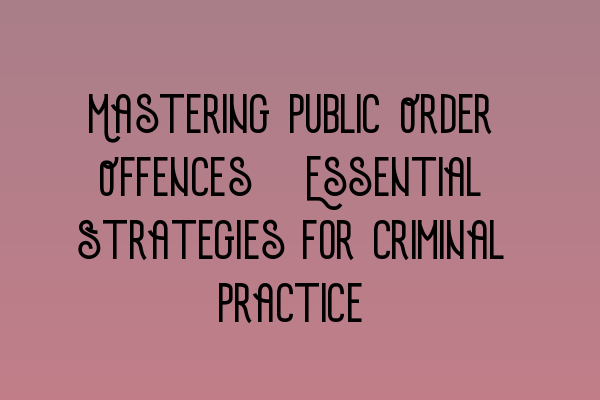Mastering Public Order Offences: Essential Strategies for Criminal Practice
Public order offences can be complex and challenging for criminal law practitioners. Successfully navigating these cases requires knowledge, skill, and effective strategies. In this article, we will explore essential strategies to help you master public order offences and excel in your criminal practice.
The Importance of Preparation
Preparation is key when dealing with public order offences. Familiarize yourself with the relevant legislation, such as the Public Order Act 1986, and stay updated on any recent developments or changes. Ensure you have a solid understanding of the elements of the offence, potential defenses, and the burden of proof.
It is also crucial to stay up to date with case law related to public order offences. This will help you identify potential arguments, precedents, and trends that may impact your case. Regularly reviewing the decisions of higher courts will ensure you are aware of any evolving interpretations of the law.
For comprehensive preparation, consider enrolling in SQE 1 Preparation Courses. These courses provide in-depth coverage of the relevant legal subjects, including public order offences, and help candidates develop the necessary knowledge and skills to succeed in their exams.
Building a Strong Defense
Building a strong defense is crucial in public order offence cases. Start by thoroughly reviewing the evidence against your client. Look for any inconsistencies, gaps, or weaknesses that can be exploited in your defense strategy. Analyze witness statements, CCTV footage, and any other available evidence to identify potential flaws or alternative explanations.
Consider employing experts or specialists who can provide technical or scientific support for your defense. For example, in cases involving allegations of disorderly conduct at a public event, an expert in crowd behavior or psychology may be able to challenge the prosecution’s arguments.
A successful defense strategy often involves challenging the elements of the offence. Identify any potential defenses available under the law, such as lawful excuse, necessity, or self-defense. Thoroughly prepare your arguments and gather evidence to support your client’s position.
For additional practice and preparation, you can access SQE 1 Practice Exam Questions and SQE 1 Practice Mocks FLK1 FLK2. These resources provide realistic scenarios and questions to test your knowledge and readiness for the SQE exams.
Negotiation and Mitigation
In many cases, negotiation and mitigation can play a significant role in achieving the best outcome for your client. Assess the strength of the prosecution’s case and gauge the potential for a favorable plea agreement. Negotiating reduced charges or penalties can help minimize the impact on your client’s life and future prospects.
When preparing for negotiations or mitigation, consider the specific circumstances of your client, their background, and any mitigating factors. Present these factors persuasively to the prosecution, emphasizing your client’s remorse, good character, or any relevant personal circumstances that may warrant a more lenient approach.
SQE 2 Preparation Courses are also available to help you develop the necessary skills for negotiating and advocating effectively. These courses cover various aspects of criminal law practice, including negotiation strategies, plea bargaining, and mitigation.
Staying Informed
Public order offences are constantly evolving, and staying informed is critical for criminal law practitioners. Regularly check for updates in legislation, case law, and procedural rules that may impact your practice. Familiarize yourself with SRA SQE Exam Dates to ensure you plan your professional development and examination preparation effectively.
Continuing professional development is vital to stay at the forefront of criminal law practice. Engage in ongoing learning and consider attending relevant seminars, webinars, or conferences to expand your knowledge, network, and stay connected with developments in the field.
In conclusion, mastering public order offences requires careful preparation, a strong defense strategy, effective negotiation and mitigation skills, and staying informed on current legal developments. By following these essential strategies and utilizing available resources, such as SQE preparation courses and practice materials, you can enhance your criminal practice and achieve successful outcomes for your clients.
For more information about SQE preparation and practice resources, visit the following articles:
